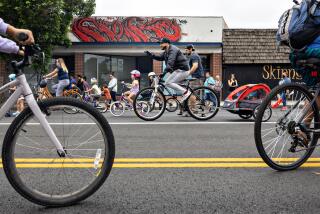L.A.’s unwise war on shopping carts
“Do you need any help out with your groceries today?”
Well yes, as a matter of fact. There are three full grocery bags in the cart. And a purse. And a 3-year-old. And that cart is a lifesaver because a person only has two arms. But instead of going all the way to the car or the bus stop, the wheels are locked and the thing won’t move. Staring down from a post and mocking shoppers is a snarky sign explaining that the carts will go only so far and then stop at an electronic barrier, and that this confounded new system is somehow there for our protection.
Those automatically locking wheels were once hallmarks of, you know, certain neighborhoods — the ones where the grocery stores eyed their customers warily and let them know that they were probably the kinds of people who would steal shopping carts, roll them home and then abandon them on the street corner. But now, they’re appearing all over town. If you’re parked in the lot, no problem, but if you’re on the street, let’s hope you brought along a Sherpa to carry your stuff.
Now the City Council has unanimously passed, and Mayor Antonio Villaraigosa has signed into law, an ordinance that will actually require all new stores with more than six shopping carts to include locking wheels — or carts with tall vertical poles that bang up against barriers, or a grocery-lugging attendant, or some other way to ensure that carts don’t end up on streets as a kind of portable urban blight. The Planning Department is under orders to study, as soon as any money turns up in city coffers, how to require existing stores to also keep their carts on the premises.
Like a broken window that goes unrepaired, abandoned shopping carts are a problem and lend a depressing, transient air to a street. Any ideas about wrangling them ought to be considered. But really, a law mandating that stores erect barriers or provide carry-out service? Aren’t there already too few grocery stores in many parts of town? Does city government really need to devise another reason for a company not to build a new store? City Hall should be making it easier and less costly to build and operate a market, not adding more burdens.
Besides, it’s in the markets’ best interest to police their costly runaway carts, and in fact it is the grocery chains’ association that pays for those roving trucks that pick them up. They are better and faster at collecting carts than the city is at responding to complaints about other junk. Maybe we need to require locking devices on old couches.
The city of Los Angeles too often does a poor job of selecting problems to solve and ways to solve them; this is a good example. Abandoned carts are an issue, not a crisis, and making them less useful to shoppers makes life a little harder for all Angelenos.
More to Read
A cure for the common opinion
Get thought-provoking perspectives with our weekly newsletter.
You may occasionally receive promotional content from the Los Angeles Times.






